Golden Retrievers bring so much joy into our lives with their playful energy and loving nature. However, behind the wagging tail and bright smile lies the need for good nutrition and portion control. A balanced diet is the foundation of your dog’s health. Knowing how much to feed them is just as important as choosing the right food. Proper portion control helps maintain a healthy weight, prevents obesity, and ensures that your Golden Retriever gets the optimal nutrition they need to thrive. Unfortunately, many Golden Retriever owners make common feeding mistakes that can lead to weight gain, digestive issues, and other health problems. These mistakes can range from overfeeding and underfeeding to misinterpreting feeding guidelines and ignoring your dog’s individual needs. This blog Dog Foods for Golden Retrievers: How Much Should They Eat? addresses these common mistakes and provides a detailed guide to portion control for your Golden Retriever. We discuss how much Food they should be fed based on their age, activity level, and physical condition. We also offer practical tips and strategies to help you avoid feeding mistakes and ensure your Golden Retriever is happy, healthy, and at a healthy weight.
Contents
- 1 Factors Affecting Nutritional Needs
- 2 Feeding Guidelines by Age and Life Stage
- 3 Choosing the Right Dog Foods for Golden Retrievers
- 4 Measure Portions and Avoid Overfeeding
- 5 How to Adjust Food Portions Over Time
- 6 Common Nutrition Mistakes to Avoid
- 7 Golden Retriever Feeding Schedule Sample
- 8 Conclusion
Factors Affecting Nutritional Needs
There is no one-size-fits-all method for determining the right portion size for your Golden Retriever. There are several factors that affect your dog’s individual nutritional needs. That’s why it’s important to tailor a meal plan to your specific needs.
Age:
Puppies:
Growing Golden Retriever puppies require more calories and nutrients to support rapid growth and development. They need more frequent meals and a Food specifically formulated for puppies.
Adults:
Adult Golden Retrievers have different needs depending on their activity level. They need a balanced diet to maintain their weight and energy levels.
Seniors:
Senior Golden Retrievers have a slower metabolism and may need fewer calories to avoid weight gain. You can also benefit from special senior formulas that promote healthy joints and organ function.
Size and Weight:
A Golden Retriever’s weight and size play an important role in determining its nutritional needs. Large dogs typically require more food than small dogs. It is important to monitor your dog’s weight and adjust portions accordingly to avoid becoming overweight or underweight.
Activity Level:
A very active Golden Retriever who exercises regularly will require more calories for its activity than a moderately active or inactive dog. Consider your dog’s daily activity when determining feeding amounts.
Health Conditions:
Certain health conditions can have a significant impact on a Golden Retriever’s nutritional needs.
Allergies:
Dogs with Food allergies or intolerances may require a restricted or hypoallergenic diet.
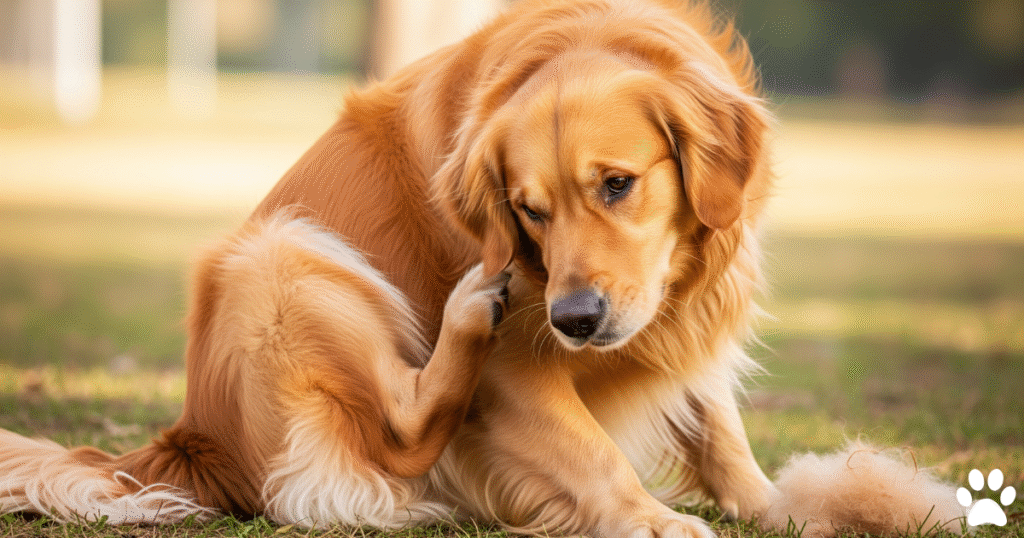
Obesity:
Overweight dogs require controlled portions and may require a weight management formula to help them safely lose weight.
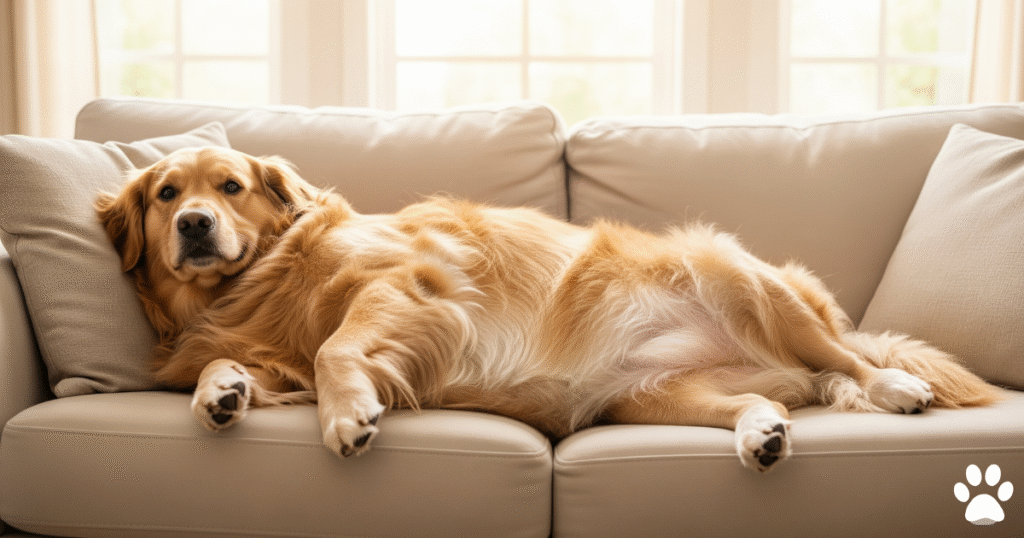
Medical Conditions:
Dogs with certain medical conditions, such as kidney or heart disease, may require a special diet to improve their health.
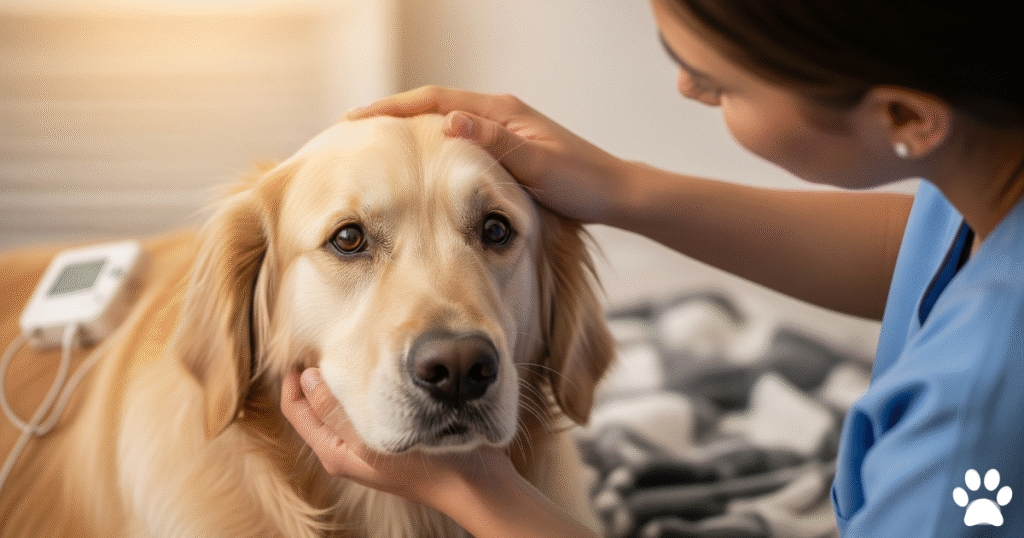
Feeding Guidelines by Age and Life Stage
Golden Retrievers, like all dogs, have different nutritional needs throughout their lives. It is important to understand these needs at each life stage to ensure optimal health and well-being.
Feeding Golden Retriever Puppies (0-12 Months)
Golden Retriever puppies grow quickly and require regular, nutritious meals. For the first few months, they need to be fed three to four times a day to support their physical development. The ideal portion size will vary depending on age and weight, so always follow the feeding instructions for the food you choose. Choose puppy food recipes from trusted brands such as Royal Canin, Purina Pro Plan, or Hill’s Science Diet. They contain the necessary nutrients for growth and development.
Adult Golden Retriever Diet (1-7 Years)
Adult Golden Retrievers need a balanced diet to maintain weight and energy levels. Recommended serving sizes vary based on weight, activity level, and metabolism. Most adult Golden Retrievers only need 1-2 meals per day. A high-quality adult Dog Food that includes real meat as the main ingredient is essential. Make sure your diet contains enough protein, healthy fats, and complex carbohydrates for long-term energy. Brands like Taste of the Wild, Blue Buffalo, and Orijen offer excellent nutrition for adults.
Senior Golden Retriever Diet (8+ Years)
As Golden Retrievers age, their metabolism slows down and they become less active. Adjusting portion sizes is important to avoid obesity, as this can worsen age-related health problems. Senior dogs often benefit from a diet specifically formulated to improve joint and digestive health. Choose foods with added glucosamine, chondroitin, and fiber. Feeding smaller meals more frequently may also be beneficial for senior dogs with sensitive stomachs. Consider purchasing specialty senior foods from brands like Hill’s Science Diet, Purina Pro Plan Bright Minds, or Wellness Complete Health Senior. For senior dogs, keep the following in mind: pay attention to their weight, make sure your dog has free access to food and water, and consult your veterinarian about age-related nutritional needs.
Choosing the Right Dog Foods for Golden Retrievers
Navigating the world of dog food can be confusing. There are countless options that promise the best for your Golden Retriever. It’s important to understand the different types of food, their benefits, and their downsides so you can make an informed decision.
Kibble or Wet Food:
Dry food is a popular, convenient, and affordable choice. It promotes oral health through chewing and has a long-lasting effect. However, it may not contain the moisture that some dogs need. Wet food, on the other hand, contains more moisture and is therefore ideal for maintaining hydration and a palatable flavor for picky or older dogs with dental issues. However, it is usually more expensive and requires proper storage after opening.
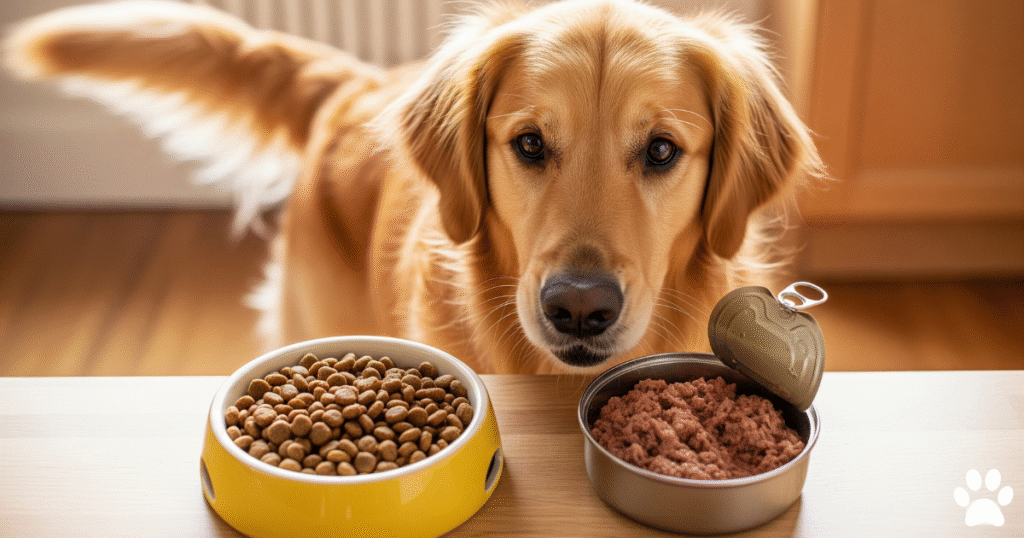
Raw Food Guidelines:
A raw food diet consisting of uncooked meat, bones, and vegetables is praised for its natural approach. While some dogs do well on a raw diet, safety is of the utmost importance. Bacterial contamination from raw meat is a risk for both dogs and humans. Good care and hygiene are essential. In addition, experience in balancing a raw food diet is necessary to ensure complete nutritional content. It is important to consult with a veterinarian or nutritionist before switching to a raw food diet.
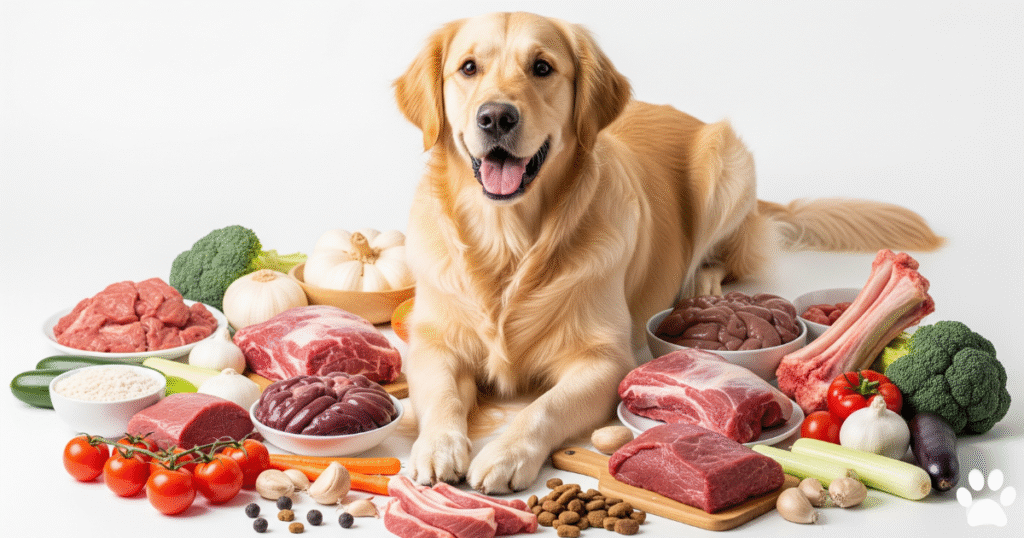
Homemade Food:
Homemade foods give you complete control over the ingredients, making them ideal for dogs with allergies or sensitivities. However, they require a lot of time and careful planning to avoid nutritional imbalances. It is important to use veterinarian-recommended recipes and carefully control portion sizes.
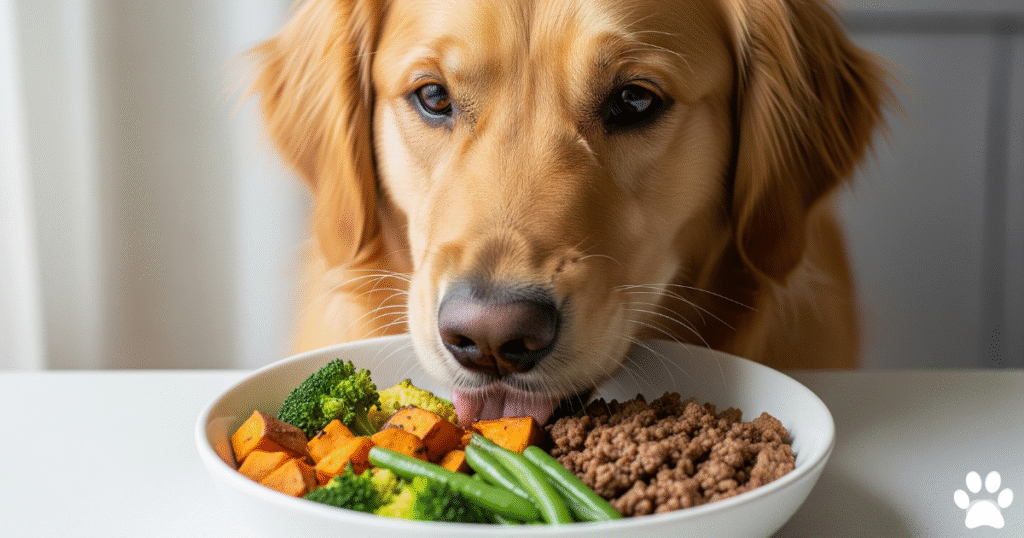
Grain-Free Diets vs. Regular Diets:
Grain-free diets are becoming increasingly popular, especially for dogs with suspected grain allergies. Although they are beneficial for dogs with grain allergies, they are not necessary for all Golden Retrievers. Whole grains provide valuable fiber for digestion and are a healthy part of a balanced diet for many dogs. Recent studies have shown that some grain-free diets can also cause heart problems. Therefore, it is important to consult with your veterinarian.
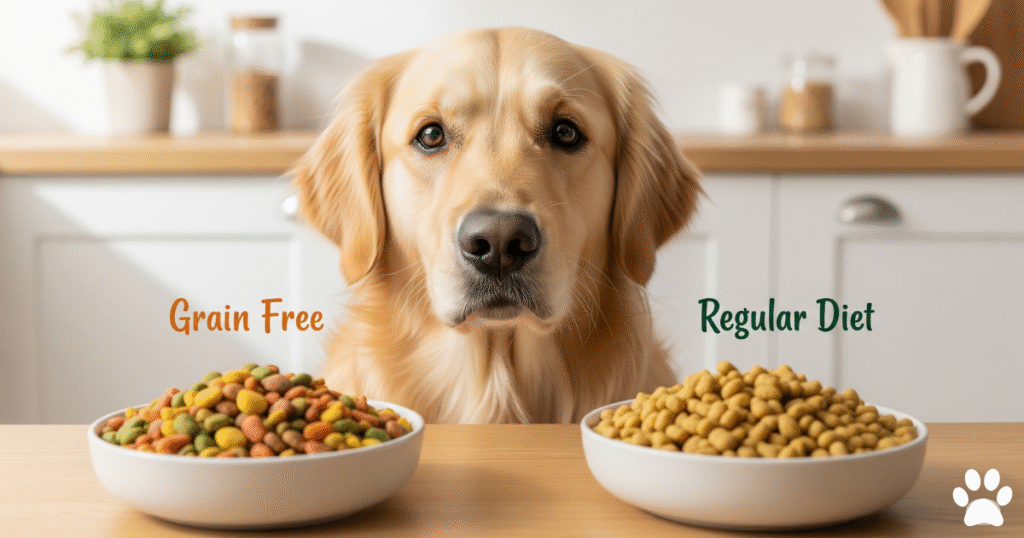
Measure Portions and Avoid Overfeeding
Maintaining your Golden Retriever’s ideal weight is essential to their overall health and longevity. Proper portion control is critical. Overfeeding is a common mistake that can lead to obesity, which in turn increases the risk of joint problems, heart disease, and other health problems.
Calculating Calorie Intake:
Determining the correct portion size starts with calculating your Golden Retriever’s daily calorie needs. This calculation is based on your weight, age, activity level, and any existing health problems. To determine your pet’s calorie needs, consult your veterinarian or use online resources. Remember that active dogs need more calories than inactive dogs, and that puppies and senior dogs have different needs.
Measuring Cup vs. Free Food:
No more free food! If you leave food out all day, it will be nearly impossible to control how much your dog eats. This can lead to overeating and weight gain. Instead, use a measuring cup to make sure you are using the correct portion size. This way, you can monitor the record and make adjustments as needed.
Signs of Overeating:
Look for signs that your Golden Retriever is eating too much. Examples include weight gain, decreased abdominal circumference, difficulty feeling the ribs, and lethargy. If you notice any of these symptoms, reduce the portion size and contact your veterinarian.
The Importance of Maintaining an Ideal Weight:
Maintaining an ideal weight is critical to the health and well-being of your Golden Retriever. It reduces the risk of joint problems, improves cardiovascular health, and increases lifespan. A healthy weight also ensures that they can lead a more active and fulfilling life.
Tips for Success:
- Use the dog feeding plan as a guide, but tailor it to your dog’s individual needs.
- Check your dog’s weight and body condition regularly.
- Don’t give him too many snacks or leftovers.
- Increase your activity level with regular exercise.
How to Adjust Food Portions Over Time
Your Golden Retriever’s nutritional needs are not static; they evolve throughout life, even with the seasons. To keep your dog healthy and vibrant, it’s important to know how to adjust food portions over time.
Puppy Growth Stages:
Golden Retriever puppies grow quickly, so their food portions may need to be adjusted frequently. During the first year, your calorie needs will fluctuate significantly. It’s important to check your puppy’s weight regularly and follow puppy feeding guidelines. Gradually increase portions as your puppy grows to support his development. The transition to adult food around one year also requires careful portion control to avoid sudden changes in weight.
Seasonal Changes in Activity Level:
Seasonal changes can have a big impact on your Golden Retriever’s activity level. During the warmer months, they may be more active and need more calories to complete their adventures. However, during the colder months, they may be less active and need to eat smaller portions to avoid weight gain. Consider adjusting portions throughout the year based on your activity level to help maintain a healthy weight.
Adjusting Portions When Gaining or Losing Weight:
If your Golden Retriever is gaining or losing weight, it is important to adjust their food portions. As your Golden Retriever gains weight, gradually decrease portions and increase their activity level. If they are losing weight, increase portions and consult with your veterinarian to rule out any underlying health issues. By regularly checking their Body Condition Score, you can spot weight changes early.
Consult your veterinarian for a customized diet plan:
For Golden Retrievers with certain health issues or who require a special diet, consult your veterinarian. They can assess your dog’s individual needs and develop a personalized Nutrition plan that meets their specific requirements. They can also advise you on appropriate portion sizes and monitor their progress over time.
Common Nutrition Mistakes to Avoid
Even the most well-intentioned Golden Retriever owners can fall victim to common nutritional mistakes that can negatively impact their dog’s health. It’s important to recognize and avoid these pitfalls so your furry friend can live a long, healthy life.
The Dangers of Overfeeding and Obesity:
One of the most common mistakes is overfeeding. Taking extra pills or giving in to pleading looks can quickly lead to weight gain and obesity. Obesity in Golden Retrievers greatly increases the risk of joint problems, diabetes, heart disease, and a shortened lifespan. Stick to measured portions and consult your veterinarian for proper calorie intake.
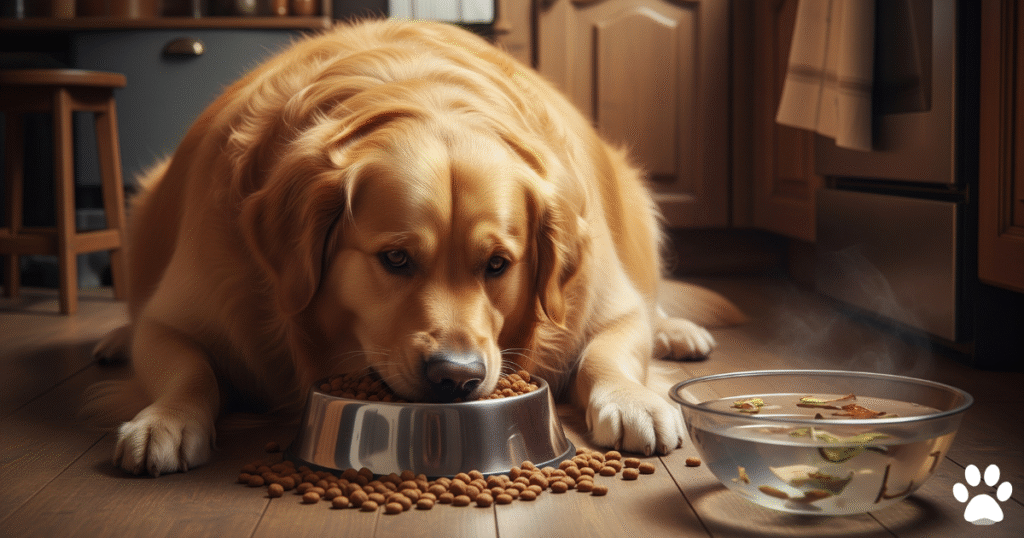
Leftovers and Unhealthy Treats:
Sharing dinner with your Golden Retriever may seem like a nice gesture, but leftovers are often loaded with fat, salt, and spices that can upset your dog’s digestive system. Over-consumption of unhealthy treats, such as processed dog biscuits or human snacks, also contributes to weight gain and an unbalanced diet. Opt for healthy treats, such as carrots, blueberries, or small pieces of lean meat.
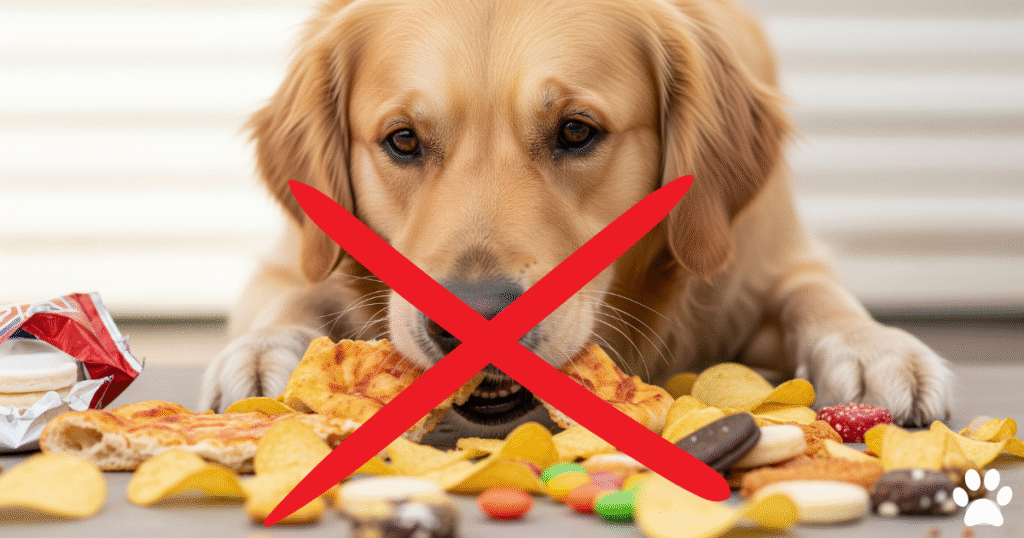
Not Enough Fresh Water:
Water is essential for all living things, including Golden Retrievers. Dehydration can lead to serious health problems. Provide your dog with access to fresh, clean water throughout the day. Change the water regularly and make sure there are multiple bowls of water available, especially in hot weather.
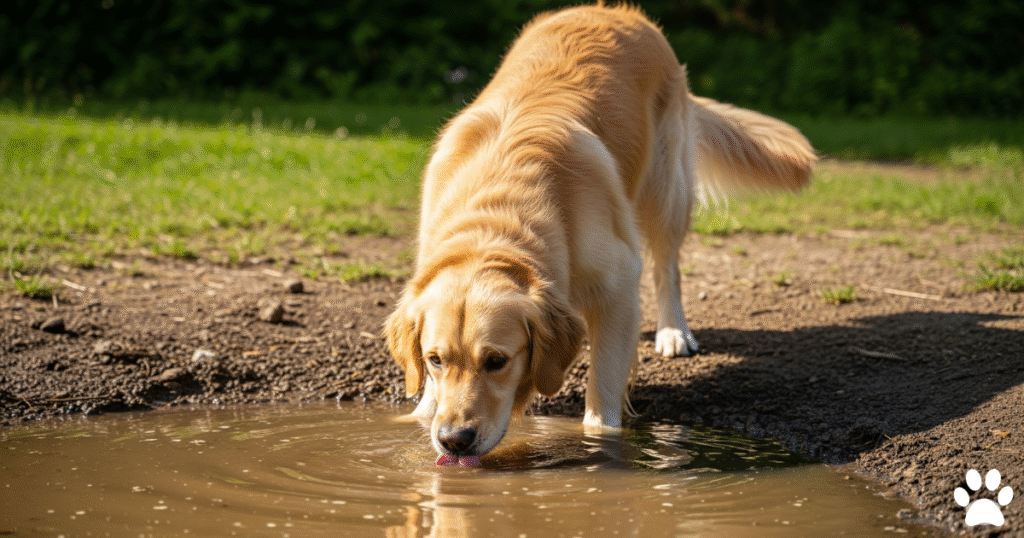
Ignoring Nutritional Balance:
A balanced diet is essential for the overall health of your Golden Retriever. Ignoring nutritional needs can lead to deficiencies and health problems. Choose a High-quality food that is appropriate for your dog’s age, activity level, and specific health needs. Don’t just guess; ask your veterinarian for advice on appropriate food selection and portion sizes.
Golden Retriever Feeding Schedule Sample
Creating a consistent feeding schedule is critical to the health and well-being of your Golden Retriever. This sample meal plan serves as a general guide. However, please remember that individual needs will vary based on activity level, metabolism, and health conditions. Always consult your veterinarian for individualized advice.
| Age/Weight | Meal Frequency | Portion Size (Cups per Meal) | Notes |
| Puppy (8-12 weeks) | 4 meals/day | 1/2 – 3/4 cup | High-protein food; frequent meals for stable blood sugar. |
| Puppy (3-6 months) | 3 meals/day | 3/4 – 1 cup | Gradually increase portions; monitor weight gain. |
| Adult (1-7 years) | 2 meals/day | 2 – 3 cups | Adjust based on activity level; highly active dogs need more. |
| Senior (8+ years) | 2 meals/day | 1.5 – 2.5 cups | Lower calorie intake; consider senior-specific formula for joint health. |
| Puppy (8-12 weeks) | 4 meals/day | 1/2 – 3/4 cup | High-protein food; frequent meals for stable blood sugar. |
Conclusion
Proper nutrition and portion control are essential to the health and well-being of your Golden Retriever. We explore the importance of tailoring nutrition to age, activity level, and individual needs. We emphasize the importance of a balanced diet and consistent meal times. Dog Foods for Golden Retrievers: How Much Should They Eat is a crucial topic because puppies need regular, nutritious meals to grow, adult dogs need balanced portions to meet their nutritional needs, and senior dogs benefit from a balanced diet and joint support. Feel free to adjust portions based on your activity level and any changes you notice. While this guide contains valuable information, every Golden Retriever is unique. We highly recommend that you consult with your veterinarian for personalized nutritional recommendations. They can help you create a personalized nutrition plan and address specific concerns.
Dr. Nabeel A.
Hi, I’m Dr. Nabeel Akram – a farm management professional by trade and a passionate Golden Retriever enthusiast at heart. With years of experience in animal science and livestock care, I’ve built a career around understanding animals—how they live, thrive, and bring value to our lives. This blog is a personal project born from that same passion, focusing on one of the most loyal and lovable breeds out there: the Golden Retriever. Whether I’m managing farm operations or sharing insights on canine health, behavior, and care, it all ties back to one core belief—animals deserve thoughtful, informed, and compassionate attention. Welcome to a space where professional expertise meets genuine love for dogs.
Facebook |
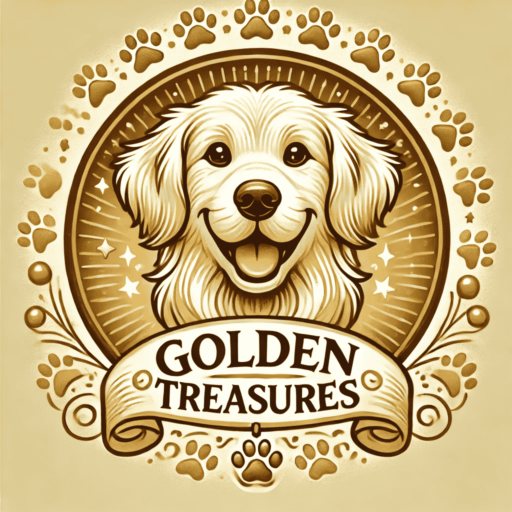
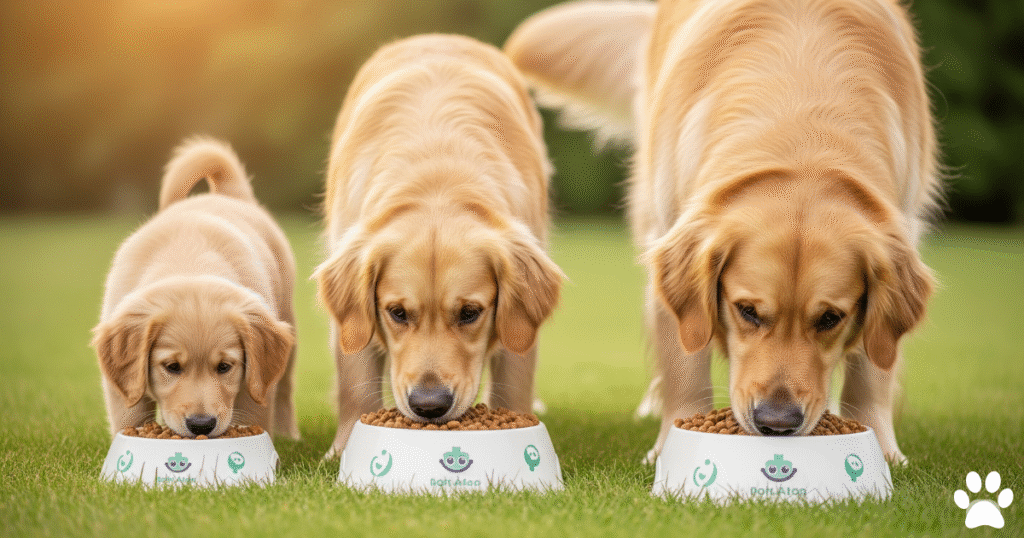
Links will be automatically removed from comments.